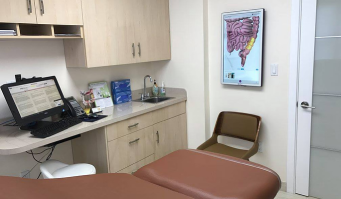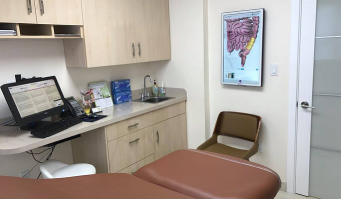Diarrhea
- Over 1000 5 Star Reviews
- Personalized Care
- Award Winning GI Specialist
What Is Diarrhea?
Diarrhea, characterized by loose and watery bowel movements, is a common issue that typically resolves within 2 to 3 days. While most individuals experience diarrhea only a few times per year, some may suffer from it more frequently due to underlying conditions like irritable bowel syndrome (IBS) or others.
Causes of Diarrhea?
- Allergies to certain foods
- Stomach Flu
- IBS
- Crohn’s disease
- Ulcerative colitis
- Eating foods that upset the digestive system
- Infection by bacteria
- Laxative abuse
- Running
- Some cancers
- Surgery on your digestive system
- Malabsorption
Symptoms of Diarrhea?
- Bloating in your belly
- Thin or loose stools
- Watery stools
- An urgent feeling that you need to have a bowel movement
- Nausea and throwing up
Diagnosing of Diarrhea ?
If you’re experiencing persistent diarrhea, our doctors want to find out what’s causing it so During your consultation, your doctor will inquire about your medical history, current medications, and your recent dietary and beverage intake. They will then conduct a physical examination to assess for dehydration and abdominal pain. To further pinpoint the cause of your diarrhea, they may recommend additional tests, such as: they can treat it properly. When you visit our offices, they will perform a comprehensive physical checkup and take a full history.
- Blood tests: To identify potential underlying diseases or disorders.
- Colonoscopy: In rare cases, your doctor may utilize a thin, flexible tube equipped with a camera and light to visualize the inside of your colon. This procedure allows for tissue sampling if necessary. Alternatively, a sigmoidoscopy focusing solely on the lower colon may suffice.
- Stool tests: To detect the presence of bacteria or parasites.
Treatment of Diarrhea
For mild cases of diarrhea, medication might not be necessary. Adults can consider over-the-counter options like bismuth subsalicylate or loperamide, available in liquid or tablet form.
Maintaining hydration is crucial. Aim to drink at least six 8-ounce glasses of fluids per day. Electrolyte replacement drinks, caffeine-free soda, chicken broth (without fat), tea with honey, and sports drinks are all good choices. Sip small amounts of fluids frequently throughout the day, avoiding consumption with meals.
Liquid probiotics may offer additional benefit.

“Thank you for visiting Forest Hills Gastroenterology & Liver Disease, my goal is to treat my patients in a highly personalized manner and I am dedicated to give you the utmost attention and respect that you deserve. For more infromation on this disease or to schedule a consultation with me, please give us a call or book a tele-health appointment online.”
Albert Shalomov
Dr. Albert Shalomov, MD
Disclaimer: Educational Infromation, Not Medical Advice
It’s important to remember that the information provided here is intended for educational purposes only and should not be misconstrued as definitive medical advice. Always seek the guidance of a qualified gastroenterologist for accurate diagnosis and treatment of any specific gastrointestinal condition. Only trained healthcare professionals can provide personalized recommendations and ensure your well-being.




